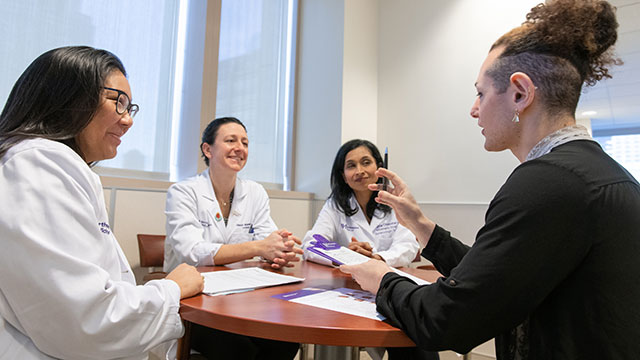From transition-related surgeries to fertility counseling, a new Northwestern Medicine program recently launched to provide transgender and non-binary individuals with gender-affirming, supportive medical services that treat the “whole person” throughout their lifetime.
Called the Gender Pathways Program, the initiative offers coordinated multidisciplinary care by more than a dozen Northwestern Medicine physicians in obstetrics and gynecology, urology, reproductive endocrinology and infertility, internal medicine, family medicine and plastic surgery at Northwestern Memorial Hospital.
The program offers feminizing and masculinizing facial, top and bottom surgeries, as well as connections for hormone therapy, primary care, preventive health screenings and laser hair removal.
“We want to make Northwestern Medicine the medical home for as many people as possible, not just providing transition-related surgery but lifelong, supportive and safe care,” said Dr. Sumanas Jordan, assistant professor of plastic surgery at Northwestern University Feinberg School of Medicine and a Northwestern Medicine plastic surgeon specializing in gender-affirming surgery and transgender health care. “Whether it’s surgical transition, general gynecology, fertility counseling, internal medicine, social work or psychology, we have trusted colleagues in each of those medical subspecialties who can provide affirming, thoughtful care.”
We want to make Northwestern Medicine the medical home for as many people as possible, not just providing transition-related surgery but lifelong, supportive and safe care.”
Assistant professor of plastic surgery
While developing the program, Jordan and her co-founders worked with members of the transgender community to garner their input on their specific health care needs.
“We are being thoughtful that the entire system and the spaces in the hospital are as affirming as possible, in addition to providing high-quality surgery,” said Jazz McGinnis, Gender Pathways’ program coordinator who works with patients to provide social work assessments, coordinate their care between departments and support inclusive, comfortable care for transgender and non-binary patients throughout the health system. “We are really trying to be intentional about our multidisciplinary team. We show patients we are all on the same page and here to support them as a whole person.”
The Gender Pathways program will also offer research, advocacy and education about transgender or gender non-binary individuals within the health care space.
“Things came together for our program at a great time,” Jordan said. “State and local governments are coming together to promote transgender rights, and we have a number of providers who want to make sure trans health care is a priority. That said, we have a lot of work ahead of us. We are doing everything at the highest level to meet the needs of our patients.”


